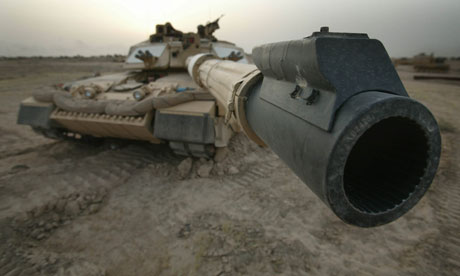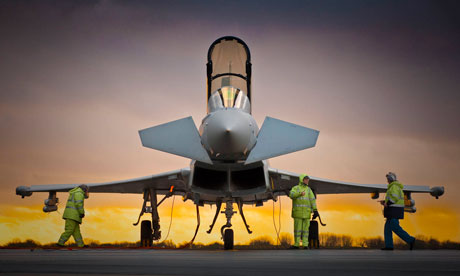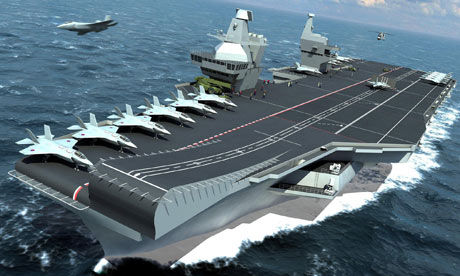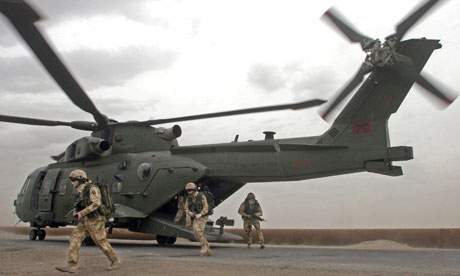By Simon Jenkins
Friday 5 November 2010
Courtesy Of "The Guardian"

Six months ago I proposed in the Guardian that if Britain was short of money it should cut defence. I did not mean reduce defence, or trim defence. I meant cut it altogether. We are desperately short of money and absolutely no one is threatening to attack us now or in the foreseeable, indeed conceivable, future. Besides, as we have seen this past week, other ways of ensuring security make more pressing claims on us. We just do not need an army, navy or air force. So why are we paying £45bn for them?
I am not a pacifist. I accept the need to fight to protect my home, hearth and nation and, in extremis, to uphold some concept of global civilisation against an all-consuming tyrant. I grew up accepting the danger of a nuclear war exchange as real; I was never a member of CND. Nonetheless, it stands to reason that all public expenditure must justify its claim on the taxpayer, especially one such as defence that is essentially precautionary. Defence is an insurance premium, a massive one. But it cannot merely be asserted as necessary, and left to professionals to fix the premium.
Thirteen years ago, I had my defence epiphany on the lay committee for Labour's first and only strategic defence review in 1997. This was under George Robertson. I vividly remember our first meeting when we were given our terms of reference. Such was the radical mood of those euphoric early Blair days that were told to think the unthinkable and discuss everything, no holds barred.
This lasted about five minutes. It turned out we could not discuss the nuclear deterrent; we could not question the Trident programme and its submarines; we could not discuss the Eurofighter contract; nor could we discuss the need for two or perhaps three new aircraft carriers. I remember the smug look on the faces of service chiefs in the room. Our excluded items had nothing really to do with Britain's defence. They were political. Robertson and his colleagues were under instructions not to give an inch to the Tories on defence procurement, lest they be seen as soft on defence. We could think the unthinkable – but not the thinkable.
Only later did I realise that review laid the groundwork for a decade of indiscipline and budgetary chaos. Nothing was related to strategy, let alone foreign policy. Each service ordered what its favourite supplier made, and then kept redesigning it. Some hapless future government would pay, even if it was no longer needed. I was intrigued this year to see the MoD ask that the cost of Trident be shifted from the defence budget to the Treasury on the grounds that the deterrent had nothing to do with defence. The outcome is what David Cameron has called a car crash of a defence budget.
Anyone who takes taxes from others should be obliged to say why. In the case of most public spending, the answer is easy. It is to buy a school, hospital, road, care home or welfare benefit. In the realm of overall security I am glad money is spent on the police and the intelligence services. I accept the need for some monitoring of borders and airspace and coastline. I also accept the need for some territorial reserve, for instance to assist in civil emergencies and in UN operations.
Some taxes are an insurance against future risk, such as being ill or having a sick relative. But they are usually subject to some actuarial assessment of the risk. Defence spending is insurance of a different order. We make no actuarial calculation of the risk of British citizens dying in a military attack or of British property being destroyed. Yet we are required to part with a premium of £45bn a year to prevent it. Why?
Two weeks ago the coalition government bravely tried to answer this question. It published a list of threats to Britain's security in what I must say is one of the most bizarre documents to emerge from the ectoplasm of the MoD. It was a paranoid's manifesto, a Matrix movie horror. Admittedly, the authors had a tough job. There is no Wehrmacht hovering across the Channel, no Napoleonic Grande Armée massing at Calais and no megaton missile with itchy communist fingers pointing at Britain. So how on earth were they to justify £45bn? They decided, in their tidy way, to group various so-called threats into three tiers of seriousness.
The first tier contains four threats, like a Russian doll. Number one, presumably the greatest, is "attacks on British cyberspace by states and cyber-criminals". The second is international terrorism. The third is a "military crisis" between other states, one that "draws in" Britain. The last is "a major accident or natural hazard that requires a national response," such as coastal flooding or flu.
The second tier of threats comprise "an attack from another state using chemical, biological, radiological or nuclear weapons". Next come "instability, insurgency or civil war overseas," that affect us by somehow "creating an environment that terrorists can exploit to threaten Britain". In other words terrorism again. Next is a big rise in organised crime. Next is "severe disruption to satellite-based information, possibly deliberate from another state". This is a repeat of the cyberspace threat.
Lastly we have the third tier of threats, the least serious. The first is "a large-scale conventional military attack on Britain" by an unspecified other state. The second, somewhat desperately, is terrorism again, the third is crime again. The authors clearly ran out of threats, but had to fill their threat quota. We are also threatened by immigrants and smugglers "trying to cross the UK border". We are "threatened" by an accident at a nuclear site; by a conventional attack on a Nato ally, and by an attack on a British colony. Finally, we face a curious bundle of threats: fuel shortages, price instability, and "a short- to medium-term disruption to international supplies or resources".
 A Eurofighter Typhoon: was not up for discussion in the 1997 strategic defence review. Photograph: Ray Troll
A Eurofighter Typhoon: was not up for discussion in the 1997 strategic defence review. Photograph: Ray TrollYou may note that almost none of the above is a threat. They are crimes and catastrophes or, in the case of being "drawn in" to a foreign conflict, a matter of political choice. Many things on the list may make me feel a bit uncomfortable, but few are remotely to do with the security of the state. They are incoherent and repetitive and rather desperate, like a madman with a sandwich board crying, "They are coming to get you; the end is nigh!"
Yet this list was the basis for last month's strategic defence review with its £45bn price tag. A set of threats that are almost entirely non-military is to be met by submarines carrying nuclear missiles, two new aircraft carriers and dozens of jet fighters.
Let's start with the threat of a nuclear missile landing on Britain. I have seen no analysis of how this might emerge from the existing international order, and certainly no explanation of how nuclear deterrence might apply in any specific case. In the barely conceivable eventuality of Iran or some such hostile state building a bomb, buying a missile capable of reaching Britain and then firing it, the act would be so lunatic as to be beyond any plausible deterrence. You cannot deter a suicidal nation any more than you can a suicidal bomber. Small wonder defence chiefs wanted their nuclear missile reclassified as "political".
As for using this precious weapon to deter a conventional attack, that is surely no less fanciful. Britain's possession of nuclear missiles has had no deterrent value in any of the dozen wars it has fought in half a century. Did we threaten Argentina with it? No. Yet time and again military strategists refer to it as a useful "reserve capability". When a soldier resorts to abstract nouns you know he has lost the argument.
As for the threat of a conventional attack on the British Isles by another state, we can only ask, who? The threat is so negligible as to be insignificant. It is like insuring one's house for billions of pounds against an asteroid attack. Is the attack to come from Russia, or France, or Germany, or Ireland? Defence pundits to whom I put this crucial question look down their noses, as if it were impertinent or undergraduate. They murmur that one can never know. Yet the political preconditions for a conventional attack on Britain are so distant – the review relegates it to tier three – that Britain would have some notice and time to re-arm, as we did with remarkable speed when last so confronted in 1940.
By jumbling together accidents, diseases, natural disasters and crimes as "threats", the government undermines its own plausibility. The defence lobby is trying to hijack the jobs of the police, civil rescue and medical professions. In the case of "price instability", it even wants to hijack the Financial Services Authority. These are not "threats to national security" against which we expect the defence ministry to plan or assemble conventional forces.
The same applies to the threat which the MoD has struggled for decades to make its own, that of international terrorism. The threat review is so keen that it lists it no fewer than three times. It implies a requirement to deploy conventional forces against terrorists, who might be acting as "proxy" for a state. But there is a difference between a state that wants to overpower, conquer and rule us – a ludicrous threat of no serious concern – and one that merely wants to make a nuisance in the hope of achieving some lesser goal, such as getting Britain out of Northern Ireland or making Israel into a pariah.
The latter certainly has applied, but if we were to deploy conventional forces against such a state we might, over the last quarter century, have declared war on Libya, Syria, Iran, the Irish Republic and even the state of Massachusetts. We did not. We treated an act of terror rightly as a methodology, a criminal means, not a political end. As Joseph Conrad said in The Secret Agent, the terrorist was a pest walking the street alone. His is a local and specific form of violence, causing mayhem in the hope of spreading panic and changing a state's behaviour in response to it. Terrorism has no political content unless awarded one by the victim nation.
 A computer-generated image of one of the navy's two new aircraft carriers, saved despite cuts. Photograph: MoD/PA
A computer-generated image of one of the navy's two new aircraft carriers, saved despite cuts. Photograph: MoD/PAWith the IRA and the PLO in the 1970s, the authorities played down the political significance of any outrage. Prisoners were treated as criminals and denied political status. The most limited coverage was given to their demands. Now we do the opposite. We play up the politics. I remember the admirable response to 9/11 by New York mayor Rudy Giuliani. He told New Yorkers on the day of the attack to go about their business as usual, use the park, go to a show, buy a pizza, keep working and, above all, keep spending. The trouble was, 9/11 was so awful an incident as to apparently transform a terrorist outrage into an apparent state of war, and thus admit it within the ambit of conventional defence. Nobody took any notice of what Giuliani said. They did what al-Qaida wanted, which was indulge in mass hysteria. Blair said the rules of the international game had changed – an astonishing accolade to Osama bin Laden. This cannot be unconnected with the fact that a politician's poll rating soars in the aftermath of a terrorist incident. Nothing helped George Bush more than 9/11.
Politicians rush to the cameras, dive into bunkers and warn of threats to civilisation as we know it. Conventional military forces are put on alert. Blair once rushed tanks to Heathrow in a madcap gesture of self-importance. We invaded Afghanistan for harbouring terrorists. We invaded Iraq on the thesis that it might do so. Do we now invade Pakistan and Yemen on the same basis?
Far from being deterred, terrorists and their sponsors clearly derive prestige and political clout when conventional forces are ranged against them. We thereby put them on the pedestal of state threat. By infringing our liberties and curbing our freedoms in their honour we let them win battles. By being publicly scared, as of this week's parcel bombs, we invite them to scare us some more.
Such an approach to defence is not just wasteful but counter-productive. Politicians from Blair to Cameron declare the aim of war in Iraq and Afghanistan is to make the streets of Britain safer. There is not an iota of evidence for this extraordinary claim. Most analysts, including former security chiefs in the House of Lords, say the precise opposite. These wars have made us less safe, by making Britain a prime target for terrorists and breeding homegrown terrorists in schools, colleges and mosques. Watching Gordon Brown in Helmand mouthing nonsense about boys dying for safer streets was painful. He clearly did not believe it.
So what of the other most common cause of Britain going to war, the threat of being "drawn into" someone else's squabble? First, this is not a threat but a political choice. These wars are nowadays called wars of choice. They are always beguiling. What you have, you are induced to deploy, often for the vaguest of purposes, such as "making the world a better place". The navy cites the need to stop pirates in the Indian Ocean and drug-runners in the Caribbean. Blair contributed British forces to six separate conflicts in his time in office, in Afghanistan, Sierra Leone and two each in Iraq and the former Yugoslavia. None was in response to a threat to the security of the British state. They were adjuncts to his foreign policy goal of "hugging close" to Washington.
Armies with nothing to do tend to distort the purpose for which they were formed. They become institutionalised. They coalesce into a wide constituency of veterans, territorial and political supporters, above all, equipment suppliers. As with terrorism, so with the government's other listed threats, we should ponder those who leap forward to publicise them. Whenever the BBC calls in a "security expert" to comment on the awfulness of some new threat, we should be told for whom he works. Remember Deep Throat's maxim, follow the money?
Being "drawn in" is the phraseology of the security review. But note the intransitive. Drawn in by whom? In whose interests, or on whose behalf, are we spending billions of pounds killing thousands of people in the Muslim world just now? Shouldn't we also have been "drawn in" to Rwanda, Darfur, Somalia, Sri Lanka, Burma? In each case, man's inhumanity to man has been more gross than in Iraq and Afghanistan. We did nothing.
 British troops disembarking from a helicopter at Basra in southern Iraq in 2007. Photograph: Essam al-Sudani/AFP/Getty Images
British troops disembarking from a helicopter at Basra in southern Iraq in 2007. Photograph: Essam al-Sudani/AFP/Getty ImagesFrom the earliest enunciation of liberal interventionism, it has been wanting in rigour. In 1999, Blair spoke in Chicago in favour of humanitarian "just" wars, as if they carried with them their own validation. All they carried was a clutter of moral superiority. I do not regard Germans or Japanese or Indians or Brazilians as lacking in moral fibre for not fighting alongside us in Blair's wars. I find nothing peculiarly moral, first in helping the break up of former Yugoslavia, then the break up of Serbia and now the devastation of Iraq and Afghanistan.
We are left with what I call the ontological argument for defences spending. It exists and therefore it is. It is the ultimate security, to which no concept of proportion can apply. We protect ourselves out of instinct. Like spending on health, you just cannot get enough of it.
It is a response not to known threats (such as Russia), nor even to known unknowns (such as a resurgent Russia), but to those famous unknown unknowns. The great ontologist, Donald Rumsfeld, remains the patron saint of defence expenditure.
The argument can take amazing forms. Come now, say the high priests. Just suppose another Hitler rose again, built a new Luftwaffe and U-boats, and bombed London and sank all our coastal trade. We would need a carrier. Suppose Russia falls under the sway of an oligarch with a grudge against Harrods and a business rival in Kensington Palace Gardens. Suppose he decides to nuke them. Supposed 100 suicide bombers block-booked themselves on Eurostar and went to every Premier League match. You would look pretty silly, Jenkins, wouldn't you?
I would look pretty silly, and probably I wouldn't be the only one. But for the time being, I regard such unrealities used to justify massive spending as no less silly. We can only meet realistic threats. We do not build 1,000 NHS hospitals and leave them to await the return of bubonic plague.
Britain as a sovereign state is less "under threat" today than ever in my life, indeed less than ever in its existence. That is to the credit of recent generations of British governments. But this means we do not need a defence that has been successfully rendered obsolete.
The chief threat to me today, if at all, is from crime. Yet we are appalling at combating it. Obsessed with punishment, we neglect crime prevention. To guard me from unreal foreign attack the government spends £45bn, but to guard my home and hearth from crime it spends just £6.4bn, and badly. I am defended against crime, including terrorist attack, not by an army, navy or air force, but by vigilant acquaintances of the criminals, by an alert school and mosque, by the police and by the apparatus of intelligence, espionage and diplomacy.
The truth of the matter is that our defence spending is misdirected and extravagantly out of date. We are re-equipping for Agincourt on the brink of Waterloo. We are laying down long boats for the battle of the Atlantic. We are deploying cold-war weapons against occasional outrages by fanatics with no capacity to cause the state harm.
I sometimes wonder why I see things this way, when so few others do. I am a pragmatist, not a pacifist. But I respect language, and am suspicious of the vapid cliches about national interest, punching our weight, sitting at top tables and being respected. I hate to see terrorism, a miserable perversion, accorded the accolade of grand enemy of the state. I hate to see statesmen whose job is to keep threats out of sight and mind exploiting the politics of fear.
The fault lies partly in the sloppy language used to discuss defence, which loses all ability to convey risk and proportion and slides into sloppy nouns and sloppy thinking. At that point, leaders lose touch with democracy, a serious threat to the security of any state. The only defence against that danger lies not in armies, bombs and guns, but solely in the deployment of meticulous reason.




No comments:
Post a Comment